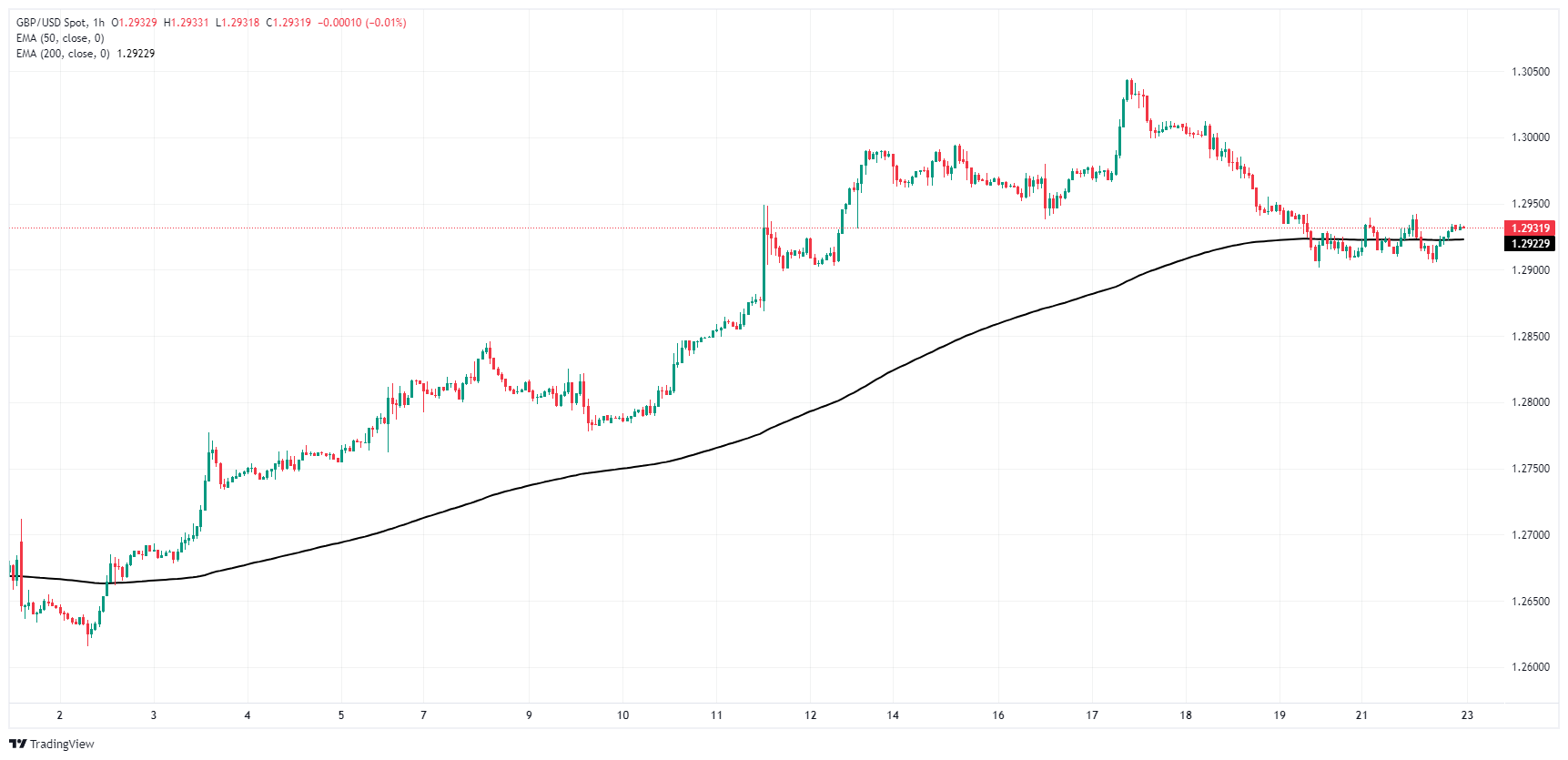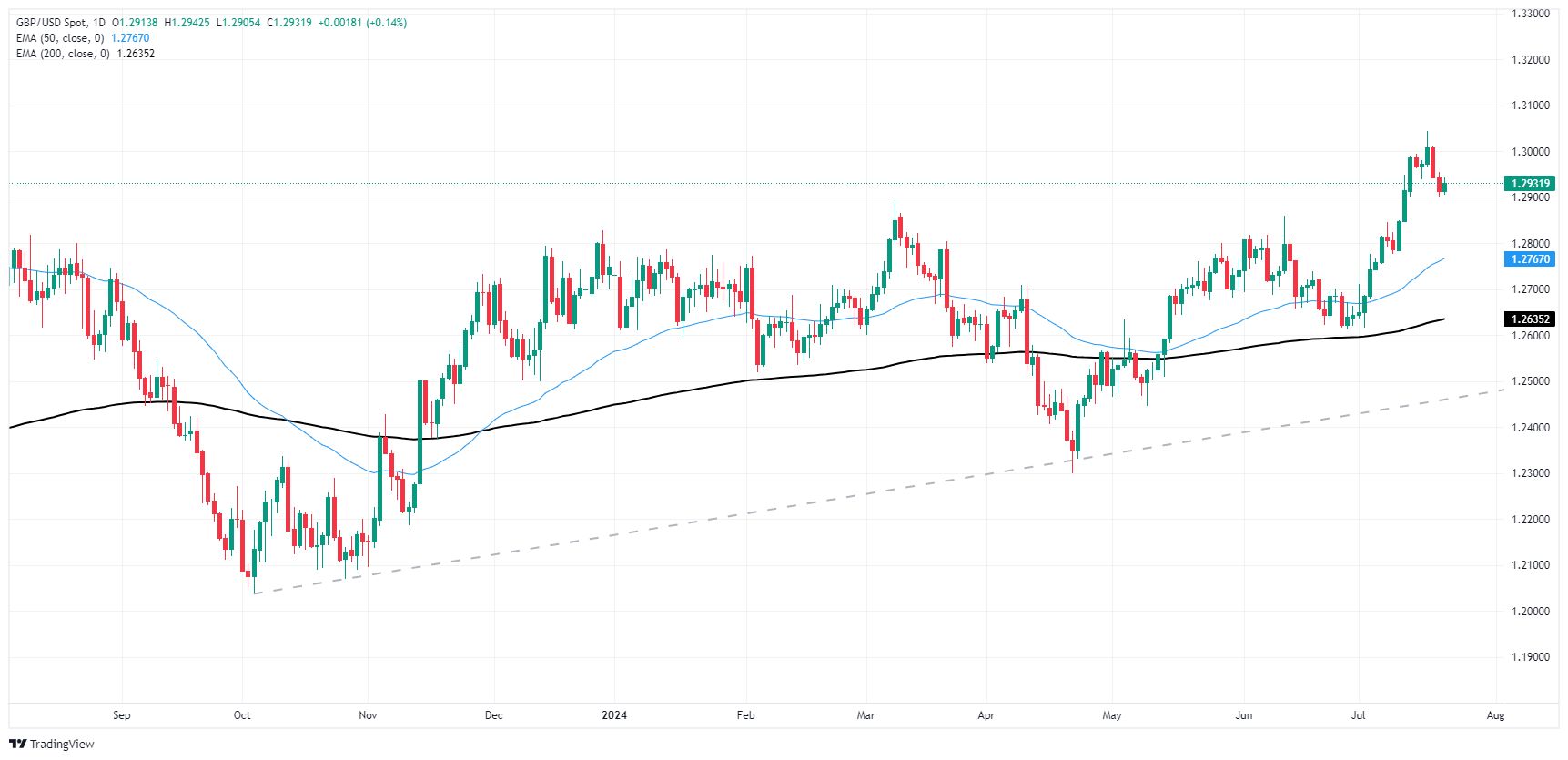- Analytics
- News and Tools
- Market News
- GBP/USD treads water as markets take a breather ahead of key data later in the week
GBP/USD treads water as markets take a breather ahead of key data later in the week
- GBP/USD cycled on Monday just above 1.2900 with low momentum.
- A quiet start to the week gives way to key data prints for both the US and the UK.
- Wednesday kicks off the week’s meaningful data with UK and US PMIs.
GBP/USD slid sideways on Monday, churning just north of 1.2900 as markets take a breather from last week’s late surge in Greenback bidding. The Cable is cycling an intraday technical level near 1.2925 as markets brace for a fresh round of key data due on both sides of the Atlantic beginning on Wednesday.
Forex Today: Key US data prompt some caution
Monday opened the new trading week on a quiet note as the economic data docket remains thin for the early week. Tuesday brings mid-tier US Existing Home Sales Change for June, while GBP/USD traders will be looking ahead to Wednesday’s double-header of Purchasing Managers Index (PMI) data prints. The UK’s Manufacturing and Services PMI for July are expected to tick up slightly, with MoM Services PMI numbers expected to print at 52.5 compared to the previous month’s 52.1.
The US follows up on Wednesday with its own PMIs. Forecasting models are expecting July’s US Services PMI to ease back to 54.4 versus the previous 55.3. Thursday will continue the high-impact US data trend with annualized Gross Domestic Product (GDP) for 2024’s second quarter. Key US inflation data will round out the trading week with Friday’s US Personal Consumption Expenditure - Price Index (PCE) inflation.
British Pound PRICE This week
The table below shows the percentage change of British Pound (GBP) against listed major currencies this week. British Pound was the strongest against the Swiss Franc.
| USD | EUR | GBP | JPY | CAD | AUD | NZD | CHF | |
|---|---|---|---|---|---|---|---|---|
| USD | 0.00% | 0.01% | -0.02% | 0.00% | 0.00% | 0.01% | 0.04% | |
| EUR | -0.01% | 0.02% | 0.00% | 0.01% | -0.02% | -0.01% | 0.02% | |
| GBP | -0.01% | -0.02% | 0.00% | -0.01% | -0.01% | -0.00% | 0.01% | |
| JPY | 0.02% | 0.00% | 0.00% | 0.02% | -0.00% | -0.00% | 0.00% | |
| CAD | -0.00% | -0.01% | 0.00% | -0.02% | -0.01% | -0.01% | 0.02% | |
| AUD | -0.00% | 0.02% | 0.01% | 0.00% | 0.01% | 0.00% | 0.05% | |
| NZD | -0.01% | 0.01% | 0.00% | 0.00% | 0.01% | -0.01% | 0.02% | |
| CHF | -0.04% | -0.02% | -0.01% | -0.01% | -0.02% | -0.05% | -0.02% |
The heat map shows percentage changes of major currencies against each other. The base currency is picked from the left column, while the quote currency is picked from the top row. For example, if you pick the British Pound from the left column and move along the horizontal line to the US Dollar, the percentage change displayed in the box will represent GBP (base)/USD (quote).
GBP/USD technical outlook
Despite being knocked off recent 12-month highs above 1.3000, Cable continues to bid above 1.2900. The pair remains firmly planted in bull country. The pair’s recent backslide still leaves bids trading well north of the 200-day Exponential Moving Average (EMA) at 1.2635.
Near-term price action remains constrained around the 200-hour EMA at 1.2922, with an intraday technical floor priced in near 1.2900.
GBP/USD hourly chart
GBP/USD daily chart
Pound Sterling FAQs
The Pound Sterling (GBP) is the oldest currency in the world (886 AD) and the official currency of the United Kingdom. It is the fourth most traded unit for foreign exchange (FX) in the world, accounting for 12% of all transactions, averaging $630 billion a day, according to 2022 data. Its key trading pairs are GBP/USD, aka ‘Cable’, which accounts for 11% of FX, GBP/JPY, or the ‘Dragon’ as it is known by traders (3%), and EUR/GBP (2%). The Pound Sterling is issued by the Bank of England (BoE).
The single most important factor influencing the value of the Pound Sterling is monetary policy decided by the Bank of England. The BoE bases its decisions on whether it has achieved its primary goal of “price stability” – a steady inflation rate of around 2%. Its primary tool for achieving this is the adjustment of interest rates. When inflation is too high, the BoE will try to rein it in by raising interest rates, making it more expensive for people and businesses to access credit. This is generally positive for GBP, as higher interest rates make the UK a more attractive place for global investors to park their money. When inflation falls too low it is a sign economic growth is slowing. In this scenario, the BoE will consider lowering interest rates to cheapen credit so businesses will borrow more to invest in growth-generating projects.
Data releases gauge the health of the economy and can impact the value of the Pound Sterling. Indicators such as GDP, Manufacturing and Services PMIs, and employment can all influence the direction of the GBP. A strong economy is good for Sterling. Not only does it attract more foreign investment but it may encourage the BoE to put up interest rates, which will directly strengthen GBP. Otherwise, if economic data is weak, the Pound Sterling is likely to fall.
Another significant data release for the Pound Sterling is the Trade Balance. This indicator measures the difference between what a country earns from its exports and what it spends on imports over a given period. If a country produces highly sought-after exports, its currency will benefit purely from the extra demand created from foreign buyers seeking to purchase these goods. Therefore, a positive net Trade Balance strengthens a currency and vice versa for a negative balance.
© 2000-2026. All rights reserved.
This site is managed by Teletrade D.J. LLC 2351 LLC 2022 (Euro House, Richmond Hill Road, Kingstown, VC0100, St. Vincent and the Grenadines).
The information on this website is for informational purposes only and does not constitute any investment advice.
The company does not serve or provide services to customers who are residents of the US, Canada, Iran, The Democratic People's Republic of Korea, Yemen and FATF blacklisted countries.
Making transactions on financial markets with marginal financial instruments opens up wide possibilities and allows investors who are willing to take risks to earn high profits, carrying a potentially high risk of losses at the same time. Therefore you should responsibly approach the issue of choosing the appropriate investment strategy, taking the available resources into account, before starting trading.
Use of the information: full or partial use of materials from this website must always be referenced to TeleTrade as the source of information. Use of the materials on the Internet must be accompanied by a hyperlink to teletrade.org. Automatic import of materials and information from this website is prohibited.
Please contact our PR department if you have any questions or need assistance at pr@teletrade.global.















